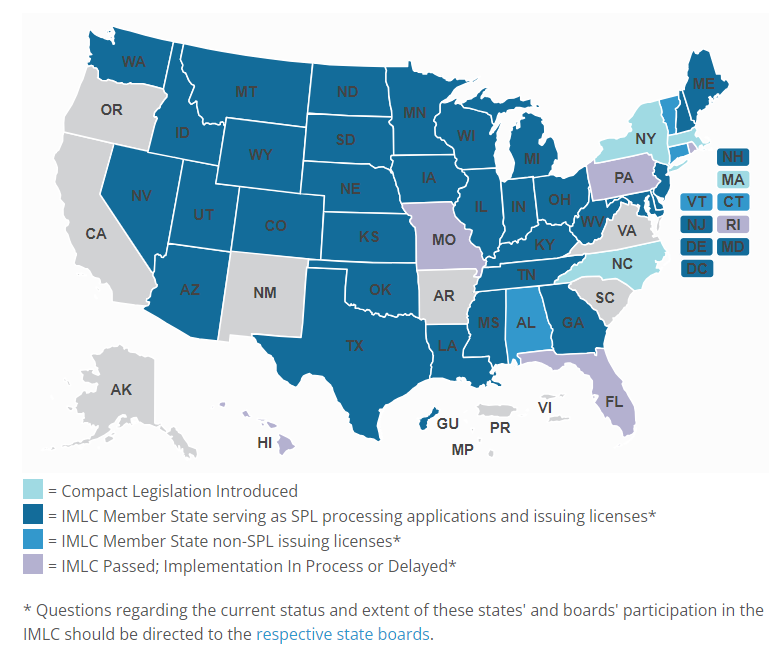For physicians seeking to broaden their professional horizons by practicing medicine in multiple states, the Interstate Medical Licensure Compact (IMLC) presents a game-changer. This innovative program eliminates the cumbersome and time-consuming process of obtaining separate licenses in each state, fostering greater professional mobility and improved access to healthcare services for patients nationwide.

Demystifying the IMLC: A Simplified Approach to Multi-State Licensure
The IMLC functions as a streamlined pathway for physicians who already hold a primary license in a participating state to obtain licensure privileges in other member states. It establishes a standardized set of requirements across participating jurisdictions, ensuring a consistent and efficient evaluation process for qualified physicians. This eliminates the need to navigate the intricacies of various state-specific licensing procedures, saving valuable time and resources for both physicians and medical boards.
Key Advantages of the IMLC for Physicians
The IMLC offers a multitude of benefits for physicians seeking to expand their practice across state lines. Here's a closer look at some of the most compelling advantages:
- Expedited Licensure: The IMLC significantly reduces the time it takes to obtain licensure in additional states. Compared to the traditional process, which can take months or even years, the IMLC streamlines the process, enabling physicians to start practicing in new locations much faster.
- Enhanced Professional Mobility: The IMLC fosters greater professional mobility for physicians. By eliminating the burden of multiple state licenses, it empowers them to pursue career opportunities across the country without facing bureaucratic hurdles.
- Standardized Requirements: The IMLC establishes a uniform set of licensing criteria across participating states. This ensures that physicians are evaluated based on consistent standards, eliminating the need to adapt to varying requirements in each jurisdiction.
- Increased Patient Access to Care: By simplifying the licensure process for physicians, the IMLC ultimately benefits patients as well. It expands the pool of qualified healthcare providers in each state, potentially reducing wait times and improving access to care, particularly in underserved areas.
A Look at IMLC Participation and Qualifications
As of today, the IMLC boasts participation from a substantial majority of U.S. states, with 40 states and one territory actively on board. Several other states are in the process of implementing the IMLC, further solidifying its national reach.
To qualify for the IMLC, physicians must possess a valid primary license from a participating state. They must also meet the IMLC's eligibility requirements, which encompass factors such as good moral character, successful completion of an accredited residency program, and passing scores on national licensing exams.
The IMLC represents a significant advancement in the realm of physician licensure. By streamlining the process and fostering greater professional mobility, it empowers physicians to deliver quality care to patients across state lines. As the healthcare landscape continues to evolve, the IMLC is poised to play a pivotal role in ensuring patients have access to the qualified medical professionals they deserve, regardless of location.

Joining PracticeMatch in 2021, Paul supports Client Sourcing's proactive recruiting model that generates a robust prospect pool, creates an effective and efficient recruiting experience and identifies key metrics to ensure optimal performance for the client. Paul has a commitment to learning, development and passion for building a team of recruiting professionals to leverage their national footprint which benefits its client organizations and their candidates. Prior to joining the PracticeMatch team, Paul served as Medical Staff Development Officer at University Hospitals, Lake Health Region in Cleveland, Ohio.
